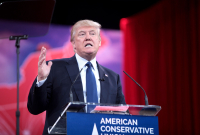Support strong Canadian climate journalism for 2025
WASHINGTON — It's been such an unusual year in American politics that the first word here goes to an African-American Democrat explaining his decision to support Donald Trump.
"I'm 100 per cent sure I'm going to vote for him," Eric Butler says. "A lot of us are living vicariously through him — he's saying and doing the things we wish we could say and do."
Butler's view is clearly offside from most Democrats. It's also a minority amongst Americans overall, given that polls don't give the braggadocious billionaire much chance of winning the 2016 election, should he emerge through the primaries.
But it offers insight into this year's most stunning political phenomenon.
Butler lists four reasons why he's making a dramatic electoral switch — from voting twice for Barack Obama, to supporting a candidate celebrated on white-nationalist websites for blasting foreign governments, Mexican migrants and Muslim visitors.
One, Trump's tough. He doesn't apologize for controversy, Butler says. Two, he's spontaneous — he says whatever's on his mind, instead of reading boring, predictable speeches off a teleprompter.
Three, he can't be controlled by the big-business lobby. He scoffs at their agenda of free trade and immigration. And, fourth, he wants to crack down on illegal migrants.
Butler works in construction. He blames undocumented foreigners for driving down the labour market, and his pay. He drives an Uber cab around Washington to supplement his wages.
Middle-class struggles make a combustible electorate. Add into the mix swift demographic change, the country's first black president and — poof! — the explosive recipe for a reality-TV star with a back-to-the-past slogan, "Make America Great Again," and an angry rallying cry for a theme song, "We're Not Gonna Take It."
That crankiness ripples throughout the political spectrum.
A historic-level 85 per cent of Americans are angry or frustrated with their government, according to Pew Research. It's especially acute among Republicans.
"I'm mad as hell," Blair Owens said during a summer rally on Capitol Hill. The retired mechanic likes Trump and Sen. Ted Cruz, who are popular with the angriest voters, as are Ben Carson and Sen. Marco Rubio.
Who are Trump supporters? According to a CNN survey this month, they're likelier to earn less than $50,000. More are men than women. They self-identify as moderates, rather than staunch conservatives.
But there's one demographic group he's especially dominating: those without a college degree. He led that group by 34 percentage points. Among degree-holders, he was in fourth place.
The anti-establishment, anti-centrist phenomenon exists on the Democratic side too — to a lesser extent.
Hillary Clinton faces a surprisingly strong challenge from the left, by Sen. Bernie Sanders. She's shifted toward his positions against the Keystone XL pipeline and the Trans-Pacific Partnership treaty.
She's weathering scandals over her secretive use of emails, her family's business ties, and an ongoing congressional probe into the deadly 2012 attack on the U.S. compound at Benghazi.
But she's surviving. While she could lose New Hampshire, according to an average of surveys, she's well ahead in Iowa and leads Sanders by almost 50 percentage points in South Carolina.
Clinton also beats most Republicans, in most polls, with one glaring exception: Rubio.
The rookie senator is emerging as the great centre-right hope — a favourite among the pro-trade, big-military, immigration-friendly traditional party establishment.
One problem for them: he's not leading polls in any primary state.
The biggest threat to Trump on the anti-establishment side is Cruz. He's rising in the polls, and leading in Iowa. The Calgary-born, Texas-raised conservative firebrand senator has so assiduously courted the insurrectionist vote that he's refused to say a negative thing about either Trump or Carson.
"Bear-hug both of them and smother them with love," is how Cruz described his game plan, in a leaked audio recording of a strategy session.
The party brass is reportedly so aghast over the idea of a Trump win, in particular, that it's considering holding its first brokered convention in 40 years.
Such a move could provoke an even wilder move: Trump bolting the party, and running as an independent. He's threatened to do it. Carson has also threatened to leave the party, if he feels cheated by its backroom operators.
An independent Trump run would badly split the Republican vote, polls say. But many voters love the idea of a third party — 60 per cent, according to Gallup.
"The parties now are not saying what needs to be said," Butler agreed.
"Maybe (Trump's) starting a future independent party."
Alexander Panetta, The Canadian Press



Comments